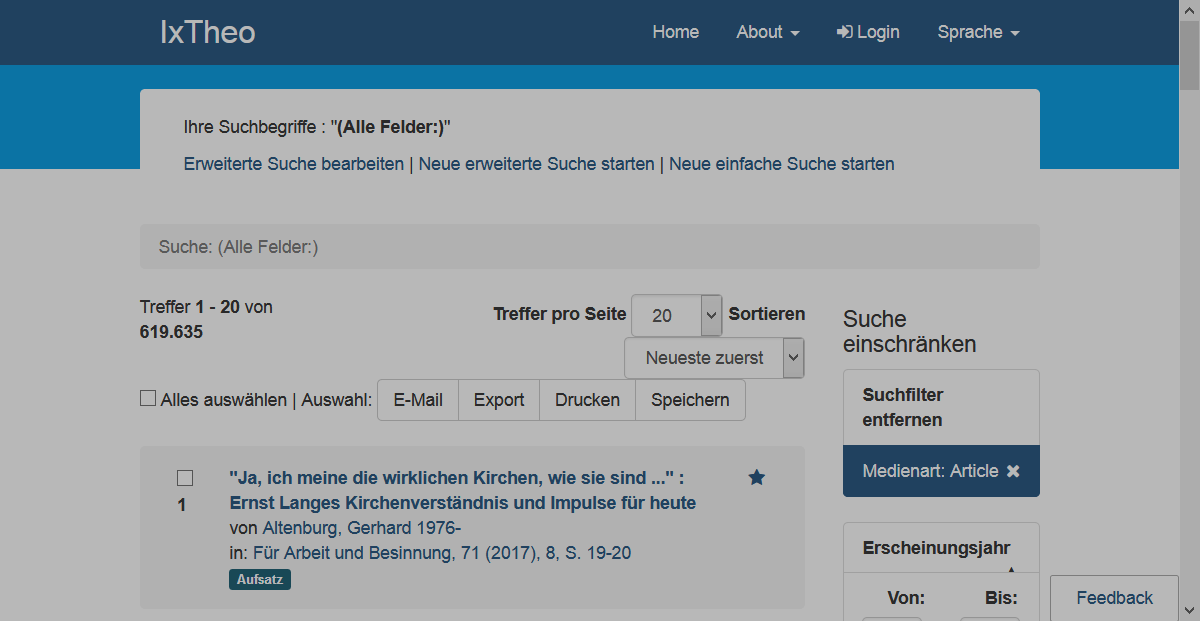Mit Open Source die Aufsatzkatalogisierung reformieren
Timotheus C.W. Kim
UB Tübingen
Dr. Philipp Zumstein
UB Mannheim


Übersicht
- Aufsatzkatalogisierung
- Index Theologicus
- Zotero
- Workflow
- Open Source und Kollaboration
- Weiterentwicklung und Ausblick
Aufsatzdaten = Big Data?
- > 100 Mio Aufsätze (in Zeitschriften, Büchern)
- bisherige Katalogisierungsworkflow skalieren nicht ohne Weiteres
- Big Data im Sinne von einer Datenmenge, welche mit den herkömmlichen Tools bzw. Workflows nicht mehr zu bewerkstelligen ist
Eppelsheimer
„Die Aufsätze ihrer Zeitschriften kann sie [Universalbibliothek] nicht bibliographieren, sie darf es gar nicht, denn diese Arbeit müßte, um eine geradezu närrische Wiederholung an einer Vielzahl von Bibliotheken zu vermeiden, zentral gelöst werden.“ Bibliothek und Dokumentation. In: ZfBB 1 (1954), S. 7
Bauhuis
"Vielleicht lohnt sich der Versuch der Zusammarbeit einiger Bibliotheken, von denen jede die Auswertung von mehreren Zeitschriften nach verabredeten Richtlinien übernimmt und Titelzettel für die anderen Bibliotheken mit vervielfältigt.“ Katalogreformen. In: ZfBB 1 (1954), S.206
Wer macht jetzt schon Aufsatzkatalogisierung?
- Dokumentationsstelle
- Spezialbibliotheken
- Landesbibliotheken
- FID-Bibliotheken
- Hochschulbibliographie
Katalogisierung damals
State Library of Tasmania offices, Hobart / Tasmanian Archive and Heritage Office https://www.flickr.com/photos/tasmanianarchiveandheritageoffice/8674319366/in/album-72157633309565762/

60 Jahre später...

Index Theologicus
Momentan: ca. 1,7 Mio insgesamt davon ~0,6 Mio. Aufsätze
Warum Aufsatzkatalogisierung im Index Theologicus?
- Forderung der Fachcommunity
- weltweit offen zugänglich
- viele ausschließlich in IxTheo laufend ausgewertete Zeitschriften
Wie Aufsätze im IxTheo
erfasst werden?
- händisch abtippen
- copy & paste
- Automatische Auswertung von gescannten Inhaltsver-zeichnissen mit manueller Kontrolle
- Datenlieferung von Verlagen
automatisch
Vorlageform
Datenqualität
alternative Methode:
- kooperativ
- (semi-)automatisch
- Open Source
(Online) Metadaten nachnutzen
-
möglichst ohne Datenverlust
-
dann verbessern
-
und anreichern
Keine "närrischen Wiederholungen"!
Webdaten
Bibliotheksdaten
???

- Literaturverwaltungsprogramm
- bibliographische Metadaten für eigene wissenschaftliche Arbeit sammeln
- Referenzlisten und Zitationen erzeugen
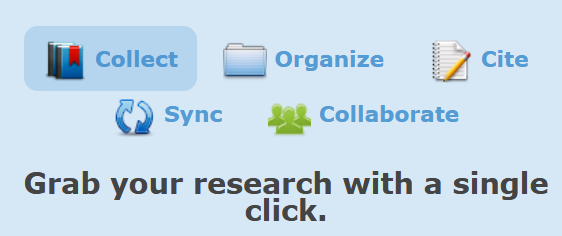
Webdaten
Literaturnachweise zum Zitieren

Zotero Translators
(Pica Format)
Wikipedia
Wikidata
Wikicite
Citoid
zotkat

Workflow
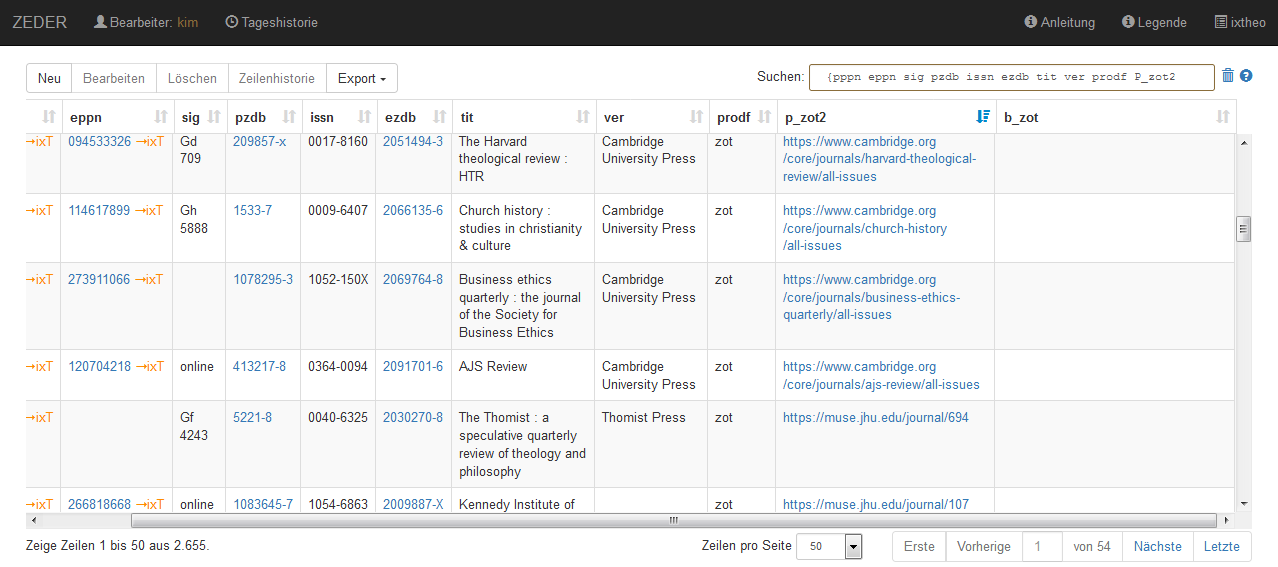
- Im internen Zeitschriftenverwaltungstool "ZEDER" recherchieren für Downloadlink und Download-Option
- Daten in Zotero herunterladen
- Einzel oder [mehrfach] in WinIBW speichern
Video zum Workflow
Datenanreicherung
- Bibliographische Gattung und Status in 0500
- IMD-Felder in 0501-0503 und 1130 (Datenträgerfeld)
- Sprachfeld in 1500 (Default-Wert mögl.)
- DOI (in 2051 od. 2053 in Druckwerken)
- Verlinkung zu PPN-ID in 3000
- Sprachabhängige Sortierzeichen vor Artikel in 4000
- Elektronische Adresse und Zugriffsart in 4085 (hier Unterfeld)
- Abstracts 4207
- Verlinkung zur Zeitschrift in 4241
- Keywords 5020
- FID-Nummer in 5056
- Lokaldatensatz mit Abrufzeichen in 8002
N: TUIXTH:23-05-17 K: TUIXTH:23-05-17 Status: TUIXTH:23-05-17
0100 488914507
0500 Oorl
0501 Text$btxt
0502 Computermedien$bc
0503 Online-Ressource$bcr
1100 2016$n[2016]
1130 cofz
1500 eng
1505 $erda
2240 BSZ: 488914507
3000 !488914493!Husgafvel, Ville
4000 On the Buddhist roots of contemporary non-religious mindfulness practice$dMoving beyond sectarian and essentialist approaches$hVille Husgafvel
4070 $v52$j2016$h1$p87-126
4085 $uhttps://journal.fi/temenos/article/view/55371$xH$xR$zLF
4207 Mindfulness-based practice methods are entering the Western cultural mainstream as institutionalised approaches in healthcare, education, and other public spheres. The Buddhist roots of Mindfulness-Based Stress Reduction (MBSR) and comparable mindfulness-based programmes are widely acknowledged, together with the view of their religious and ideological neutrality. However, the cultural and historical roots of these contemporary approaches have received relatively little attention in the study of religion, and the discussion has been centred on Theravāda Buddhist viewpoints or essentialist presentations of ‘classical Buddhism’. In the light of historical and textual analysis it seems unfounded to hold Theravāda tradition as the original context or as some authoritative expression of Buddhist mindfulness, and there are no grounds for holding it as the exclusive Buddhist source of the MBSR programme either. Rather, one-sided Theravāda-based presentations give a limited and oversimplified picture of Buddhist doctrine and practice, and also distort comparisons with contemporary non-religious forms of mindfulness practice. To move beyond the sectarian and essentialist approaches closely related to the ‘world religions paradigm’ in the study of religion, the discussion would benefit from a lineage-based approach, where possible historical continuities and phenomenological similarities between Buddhist mindfulness and contemporary non-religious approaches are examined at the level of particular relevant Buddhist teachers and their lineages of doctrine and practice.
4241 Enthalten in!42401257X!Temenos$x201600000520001913
5056 0
5520 |s|Buddhism
5520 |s|meditation
5520 |s|mindfulness
5520 |s|Mindfulness-Based Stress Reduction
5520 |s|world religions paradigm
[ILN: 19] IXTHEO< Tü 135 >
E001 23-05-17 : l01
6999 23-05-17
7100 $BTü 135#$jn
7800 970122993
7900 23-05-17 12:16:49.000
7901 TUIXTH:23-05-17
8002 ixzs;ixzo
Wie anreichern?
-
Bibliografische Gattung/Status in 0500 (Position 1 und 4)
-
PPN Zeitschrift
-
Sprache
-
FID-Nummer
ISSN abhängige Mappingkonkordanz
var journalMapping = {
"0021-9231" : "!014411350!", // Journal of Biblical Literature
};
var issnLangMapping = {
"1010-9919" : "ger",
"0044-3549" : "ger",
};
var issnVolumeMapping = {
"2031-5929" : "N.S.",
};
var issnPhysicalFormMapping = { //Feld 0500 Position 1
"1550-0195" : "O",
};
var issnLicenceFieldMapping = {
"1550-0195" : "l",
};
var issnSsgMapping = {
"0044-3441" : "0; 1", // Zeitschrift für Religions- und Geistesgeschichte
};
var defaultSsgNummer = "1";
var defaultLanguage = "eng";
var cataloguingStatus = "r";//0500 Position 3
//URL --> 4085 nur bei Katalogisierung nach "Oox" im Feld 0500
if (item.url && physicalForm === "O" && licenceField === "l") {
writeLine("4085", "$u" + item.url + "$xH$xR$zLF");
} else if (item.url && physicalForm === "O") {
writeLine("4085", "$u" + item.url + "$xH");
}
if (item.url && item.itemType == "magazineArticle") {
writeLine("4085", "$u" + item.url + "$xH");
}
//Sortierzeichen hinzufügen, vgl. https://github.com/UB-Mannheim/zotkat/files/137992/ARTIKEL.pdf
if (item.language == "ger" || !item.language) {
titleStatement = titleStatement.replace(/^(Der|Die|Das|Des|Dem|Den|Ein|Eines|Einem|Eine|Einen|Einer) ([^@])/, "$1 @$2");
}
if (item.language == "eng" || !item.language) {
titleStatement = titleStatement.replace(/^(The|A|An) ([^@])/, "$1 @$2");
}
if (item.language == "fre" || !item.language) {
titleStatement = titleStatement.replace(/^(Le|La|Les|Des|Un|Une) ([^@])/, "$1 @$2");
titleStatement = titleStatement.replace(/^L'([^@])/, "L' @$1");
}
if (item.language == "ita" || !item.language) {
titleStatement = titleStatement.replace(/^(La|Le|Lo|Gli|I|Il|Un|Una|Uno) ([^@])/, "$1 @$2")
titleStatement = titleStatement.replace(/^L'([^@])/, "L' @$1");
}
Wie anreichern?
Matching GND-IDs für Autoren
IKT0=1 TRM0=
für Persönlicher Name in Picafeld 100
IKT1=2057 TRM1=3.*
für GND-Systematik
IKT2=8963 TRM2=theolog*
für Berufsbezeichnung 550
IKT3=8991 TRM3=1[1,2,3,4,5,6,7,8][0,1,2,3,4,5,6,7,8,9][0,1,2,3,4,5,6,7,8,9]
für Geburts- und Sterbedatum (Bereich)
var lookupUrl = "http://swb.bsz-bw.de/DB=2.104/SET=70/TTL=1/CMD?SGE=&ACT=SRCHM&MATCFILTER=Y&MATCSET=Y&NOSCAN=Y&PARSE_MNEMONICS=N&PARSE_OPWORDS=N&PARSE_OLDSETS=N&IMPLAND=Y&NOABS=Y&ACT0=SRCHA&SHRTST=50&IKT0=1&TRM0=" + authorName +"&ACT1=*&IKT1=2057&TRM1=*&ACT2=*&IKT2=8977&TRM2=theolog*&ACT3=-&IKT3=8978-&TRM3=1[1%2C2%2C3%2C4%2C5%2C6%2C7%2C8][0%2C1%2C2%2C3%2C4%2C5%2C6%2C7%2C8%2C9][0%2C1%2C2%2C3%2C4%2C5%2C6%2C7%2C8%2C9]?"
Bei Vollautomatisierung
ohne intellektuelle Nachkontrolle
der verknüpften Autoren-ID wird
folgender Vermerk im Feld 8910
auf Titelebene geschrieben:
8910 $aixzom$bAutor maschinell zugeordnetZotero
WinIBW
OGND
Kontext (vordefinierte Suchaspekte):
- Berufsbezeichnung
- Lebensdaten
- etc.
Autorenname
(Textstring)
bei eindeutigem
Treffer
GND-ID
Vorteile
hohe Erschließungsqualität
Daten im Verbund nachnutzbar/-korrigierbar
langfristiger und kontrollierbarer
Metadatenpool



Kollaboration und
Open Source
Open Source Entwicklung
auf GitHub

https://github.com/UB-Mannheim/zotkat
Erweiterung von Zotero für die Katalogisierung
Kollaboration mit @anotherfami GBV
https://twitter.com/anotherfami/status/854311198749327360

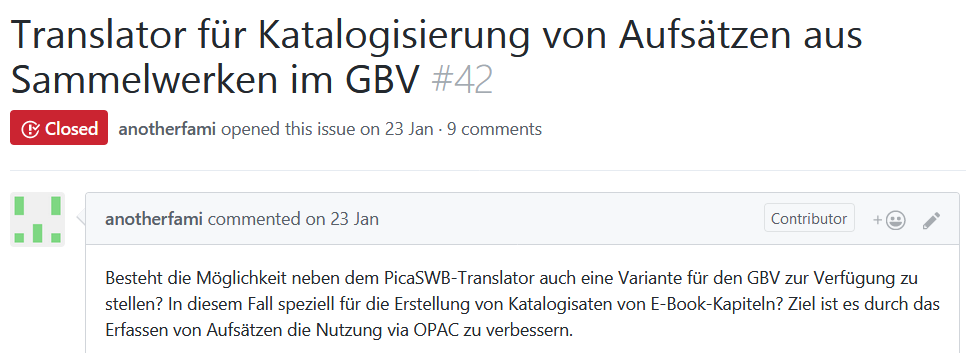
Klar! Nachnutzung erwünscht!
Auf Schultern von Riesen...
@adam3smith
Politologie, US
@aurimasv
Bioinformatik, US
@avram
Slavistik, US
@simonster
Kognitionswiss., US
@dstillman
Softwareentwickler, US
@fbennet
Jura-Professor, Japan
...
Zotero Translators Beitragende (Auswahl)
Weiterentwicklung
und Ausblick
Mögliche Anwendungsbereiche
- Retrospektive Aufsatzkatalogisierung
(National-, Allianzlizenzen) - Buchkapitel von Verlagsdaten
(Beiträge im Sammelbänden) - E-Book-Katalogisierung
- Aufbau einer Spezialbibliographie innerhalb des Verbundsystems
- Metadaten für die Hochschulbibliografie
- ...
Vollautomatisierung?
- Mehrfachspeichervorgang in WinIBW mit WinIBW-Skript und/oder Konvertierung in MARC-XML und automatische Einspeisung durch BSZ
- Kontrolle der Metadatenqualität auf Vollständigkeit
- Kontrolle der Exportergebnisse (stichprobenartig)
- Nachverknüpfung der fehlenden Normsätze




Katalogisierung von Zitationsdaten?
Linked Open Citation Database - LOC-DB-Projekt

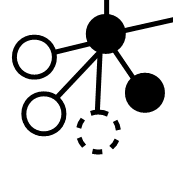


=> Vortrag am Do 1.6. um 11:00 – 11:30 (Panorama 1)
Identifier, Bibliometrie, Normdaten (TK 5)
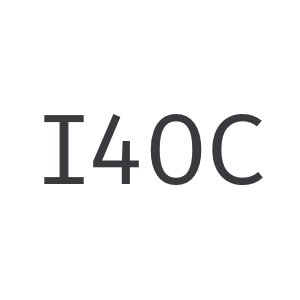

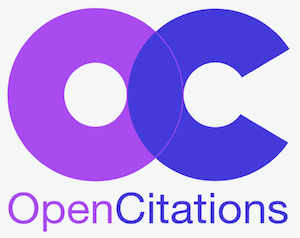
EXCITE
Bildquellen
Bildzitate (alle Rechte vorbehalten):
- github social coding. (2013). https://ccistudentcenterblog.wordpress.com/2013/09/17/git-github-collaboration-in-software-development/github-social-coding/#main (abgerufen am 28.05.2017)
Bildzitat (CC-BY-NC 2.0):
-
State Library of Tasmania offices, Hobart / Tasmanian Archive and Heritage Office https://www.flickr.com/photos/tasmanianarchiveandheritageoffice/8674319366/in/album-72157633309565762/
Bildzitat (CC-BY 3.0):
- Kim, T. C., & Zumstein, P. (2016). Semiautomatische Katalogisierung und Normdatenverknüpfung mit Zotero im Index Theologicus. LIBREAS. Library Ideas, (29). http://libreas.eu/ausgabe29/05kim/
Pixabay (CC0):
- https://pixabay.com/de/luther-figur-magdeburg-566469/
- https://pixabay.com/de/quell-offene-software-offene-software-1518247/
- https://pixabay.com/de/monitor-bin%C3%A4r-bin%C3%A4rsystem-computer-1307227/
- https://pixabay.com/en/blue-diamond-sapphire-treasure-2024021/
- https://pixabay.com/en/community-map-network-communication-158483/
- https://pixabay.com/en/open-data-database-open-access-1518223/
- https://pixabay.com/en/clones-computer-cube-data-2029896/
- https://pixabay.com/en/android-artificial-doodle-robot-159109/
- https://pixabay.com/en/dog-pet-cute-doggy-little-happy-705820/
Diverse Logos, Webseiten und Screenshots

Fragen?
Copy of Open source Zotero
By zuphilip
Copy of Open source Zotero
- 629

